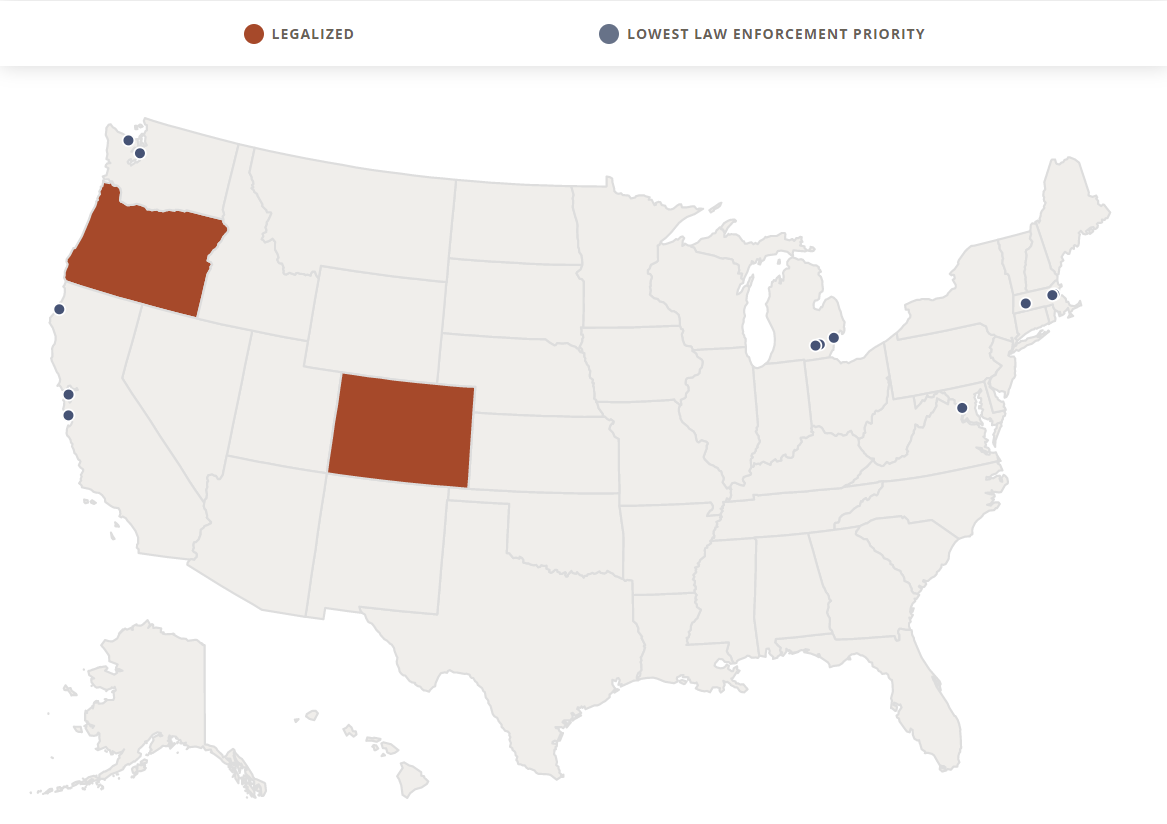This is the second installment in my write-up of the proposed Oregon psilocybin program rules. I’m jumping in midstream from where I left off yesterday in Part 1. Similar to that installment, I will highlight the major areas, and skip or skim less prominent stuff. This batch of proposed rules is 65 pages, after all. You can read them for yourself here.
License Fees (333-333-4060)
These Oregon Health Authority (OHA) fees are a little steep as compared to Oregon cannabis licensing fees, but they aren’t terrible.
- Manufacturer: $10,000
- Service Center: $10,000
- Laboratory: $10,000
- Facilitator: $2,000
These fees are halved for non-profits and certain individual applicants (people who are not rich basically, and can meet one of the enumerated criteria). Finally, everyone must pay an initial $150 application fee, which is non-refundable. There are also $250 fees associated with changes to previously approved licenses and for inspections related to on-site changes.
View the US Map of Psilocybin Legality by State
Background Checks, Application Review and Withdrawal (333-333-4100 – 4120)
Everyone has to undergo a criminal background check. This involves submission of personal information, plus fingerprints. To the good, OHA may not consider prior convictions related to possession of a controlled substance if: a) the conviction was two or more years prior to the date of application, and b) there was only one of them.
Once an application is approved, there are rules prohibiting operation until the applicant pays its licensing fee, and requiring that licensees display proof of licensure on site. In the case of facilitators, they must be able to “provide proof of licensure” when performing services.
Applications may be denied for a host of reasons, none of which are surprising. Here are the big ones:
- If a facilitator hasn’t completed required training;
- If the proposed business’ land use compatibility statement shows that the business at it site is barred by the local jurisdiction;
- If the proposed business is located within 1,000 feet of a “public elementary or secondary school for which attendance is compulsory under ORS 339.020; or a private or parochial elementary or secondary school, teaching children as described in ORS 3339.030(1)(a)”;
- If the proposed promises is located at the same location as a health care facility licensed under ORS chapter 441; or
- Failure to meet the “greater than 50 percent” resident-ownership requirements.
If an applicant has second thoughts after submitting its or their application, the applicant is allowed to withdraw the application. OHA must accept the withdrawal, unless it reasonably believes false or misleading information was submitted. In that case, OHA can hold onto the application and issue a proposed denial. A final denial would likely exclude an applicant from the program going forward.
Notification of Changes; Modifying a Licensed Premises; License Renewal (OAR 333-333-4200 – 4250)
A licensee must notify OHA if, inter alia, it closes its business for more than 30 days; or if there is a theft of products or cash from the licensed premises; or if it wishes to add or remove anyone with a financial interest in the licensed business. If the person to be removed has “applicant” (10% ownership or more) status, prior written approval from OHA is needed to proceed. I want to highlight that particular requirement, because people will be tripping on it left and right. Choose your partners wisely! And explain to new owners about OHA vetting and timing issues.
If any change in ownership is 51% or more, a new license application will be required. This is another item borrowed from the cannabis rules. OHA will be looking at majority ownership shifts as business sales, essentially.
Any “material or substantial” modification to a licensed premises must also be preapproved. The rules list examples of such modifications (bigger ticket items; not things like moving chairs around). License renewal applications must be submitted annually, at least 60 calendar days before the license expires.
Standards for Authority to Operate a Licensed Business as a [Third Party]; Closure of Business (333-333-4270)
It’s inevitable that some of these businesses and licensees will fail or fade away. Some will knuckle under with debts or litigation. The OHA has built out protocols that expand on what we’ve seen in cannabis regulation for these scenarios— including for when a licensed facilitator passes away and a personal representative succeeds to their estate.
These rules clarify what successor parties must provide to keep a license intact, and how OHA may allow a third party to run an Oregon psilocybin business. From experience, I’ll opine that getting any such approval through an administrative agency can be a learning process for all parties.
As far as business closures, the rules outline a process for destroying or transferring any remaining psilocybin product, and for allowing a licensee to wind down operations “for a reasonable period” following any death, insolvency or bankruptcy. There is also a short section on “license surrender” at 333-333-4300. Even shorter summary: it’s allowed.
____
Learn More About Oregon Psilocybin Rules:
- Oregon Proposed Psilocybin Rules: Rule Highlights
- Oregon Proposed Psilocybin Rules: Licensed Premise Requirements
- Oregon Proposed Psilocybin Rules: Service Centers
- Oregon Proposed Psilocybin Rules: Facilitators, Sessions, Dosing
- Oregon Proposed Psilocybin Rules,: Tracking, Advertising, Prohibited Conduct


























